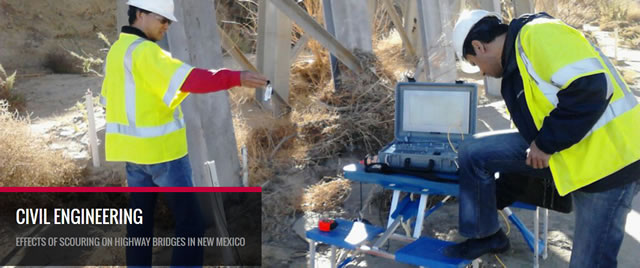
Civil Engineering ETDs
Publication Date
Fall 11-12-2020
Abstract
Satellite remote sensing (RS) techniques have revolutionized the study of spatial and temporal processes in environmental science and water resources engineering. This study was focused on advancing the understanding of RS techniques to provide estimates of spatial variability of surface water temperature and corresponding evaporation rates for open water.
Evaporation plays a crucial role in water budgets, which is critical knowledge for water management, especially in arid environments. However, there are few methods to estimate its spatial variability, which is relevant because water does not evaporate equally everywhere on a large waterbody. Hence, we cannot assume the calculations of evaporations extrapolated from a point-measurement represent an entire water body. Remote sensing technologies, such as satellite imagery, can provide a better sense of spatial heterogeneity of surface water temperatures, and hence evaporation rates.
Thermal-Infrared (TIR) sensors, provide the potential to estimate spatially varying evaporation rates from an entire water body. Several studies in the past have used TIR technologies to estimate evapotranspiration, but open-water evaporation has not been thoroughly studied. The goal of this study was to assess the applicability of TIR sensors for estimation surface water temperature and open-water evaporation rates at Cochiti Lake, New Mexico, USA. This was accomplished by comparing surface water temperature data derived from Landsat 8 imagery to in-situ measurements from a Collison Floating Evaporation Pan (CFEP). A regression approach was used to extrapolate evaporation measurements from the CFEP to the entire lake. The results indicate that these techniques hold the potential to advance knowledge of spatial variability of these variables, and hence, to improve the accuracy of water budgets for water resources management.
Keywords
Evaporation, Landsat, remote sensing, temperature mapping, spatial variation
Document Type
Thesis
Language
English
Degree Name
Civil Engineering
Level of Degree
Masters
Department Name
Civil Engineering
First Committee Member (Chair)
Dr. Mark Stone
Second Committee Member
Dr. Jacob Collison
Third Committee Member
Dr. Christopher Lippitt
Fourth Committee Member
Dr. Ricardo Gonzalez-Pinzon
Recommended Citation
Jimenez Arellano, Claudia. "Thermal Mapping and Evaporation Estimation of Cochiti Lake Using Landsat 8 Imagery." (2020). https://digitalrepository.unm.edu/ce_etds/274
